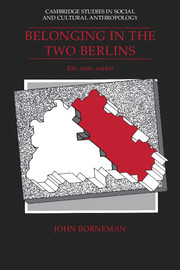
-
Select format
-
- Publisher:
- Cambridge University Press
- Publication date:
- June 2012
- October 1992
- ISBN:
- 9780511607714
- 9780521427159
- Dimensions:
- Weight & Pages:
- Dimensions:
- (228 x 152 mm)
- Weight & Pages:
- 0.664kg, 408 Pages
You may already have access via personal or institutional login
Book description
Belonging in the two Berlins is an ethnographic investigation into the meaning of German selfhood during the Cold War. Taking the practices of everyday life in the divided Berlin as his point of departure, Borneman shows how ideas of kin, state, and nation were constructed through processes of mirror-imaging and misrecognition. Using linguistics and narrative analysis, he compares the autobiographies of two generations of Berlins residents with the official version of the lifecourse prescribed by the two German states. He examines the relation of the dual political structure to everyday life, the way in which the two states legally regulated the lifecourse in order to define the particular categories of self which signify Germanness, and how citizens experientially appropriated the frameworks provided by these states. Living in the two Berlins constantly compelled residents to define themselves in opposition to their other half. Borneman argues that this resulted in a de facto divided Germany with two distinct nations and peoples. The formation of German subjectivity since World War II is unique in that the distinctive features for belonging - for being at home - to one side exclude the other. Indeed, these divisions inscribed by the Cold War account for many of the problems in forging a new cultural unity.
Reviews
‘ … a study that not only is theoretically sophisticated but also constitutes a major contribution to the anthropological study of modernity in Europe … It contributes in novel and methodologically intriguing ways to our understanding of the complex relationships among state, kinship and narrative, and it throws refreshingly critical light on received ideas about the current state of German society and culture.’
Michael Hersfeld
Contents
Metrics
Altmetric attention score
Full text views
Full text views help Loading metrics...
Loading metrics...
* Views captured on Cambridge Core between #date#. This data will be updated every 24 hours.
Usage data cannot currently be displayed.
Accessibility standard: Unknown
Why this information is here
This section outlines the accessibility features of this content - including support for screen readers, full keyboard navigation and high-contrast display options. This may not be relevant for you.
Accessibility Information
Accessibility compliance for the PDF of this book is currently unknown and may be updated in the future.


